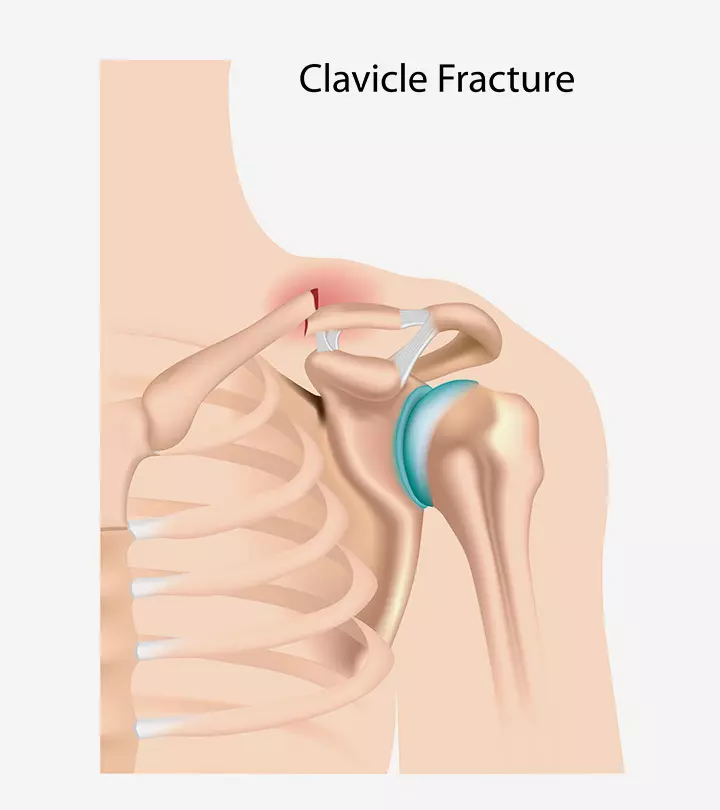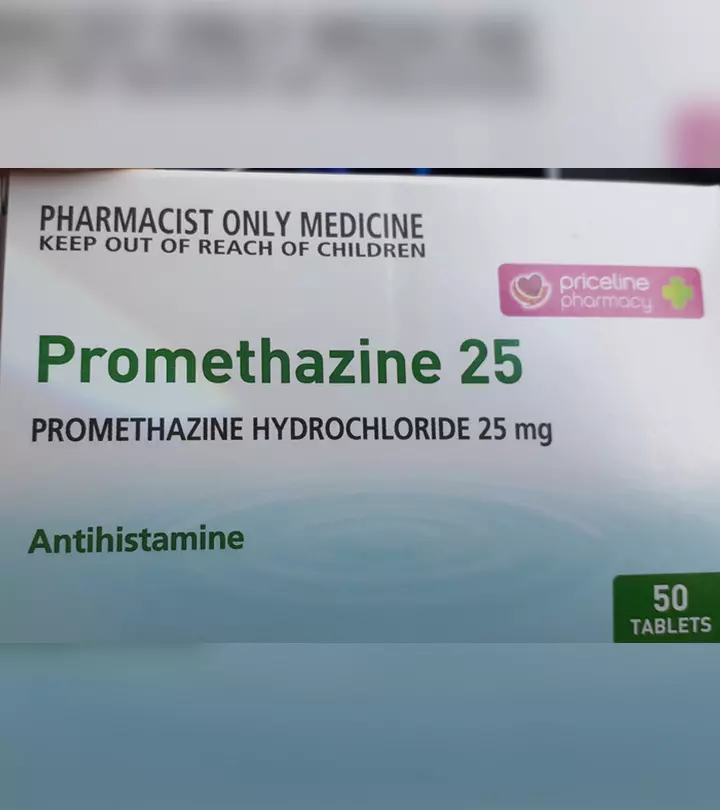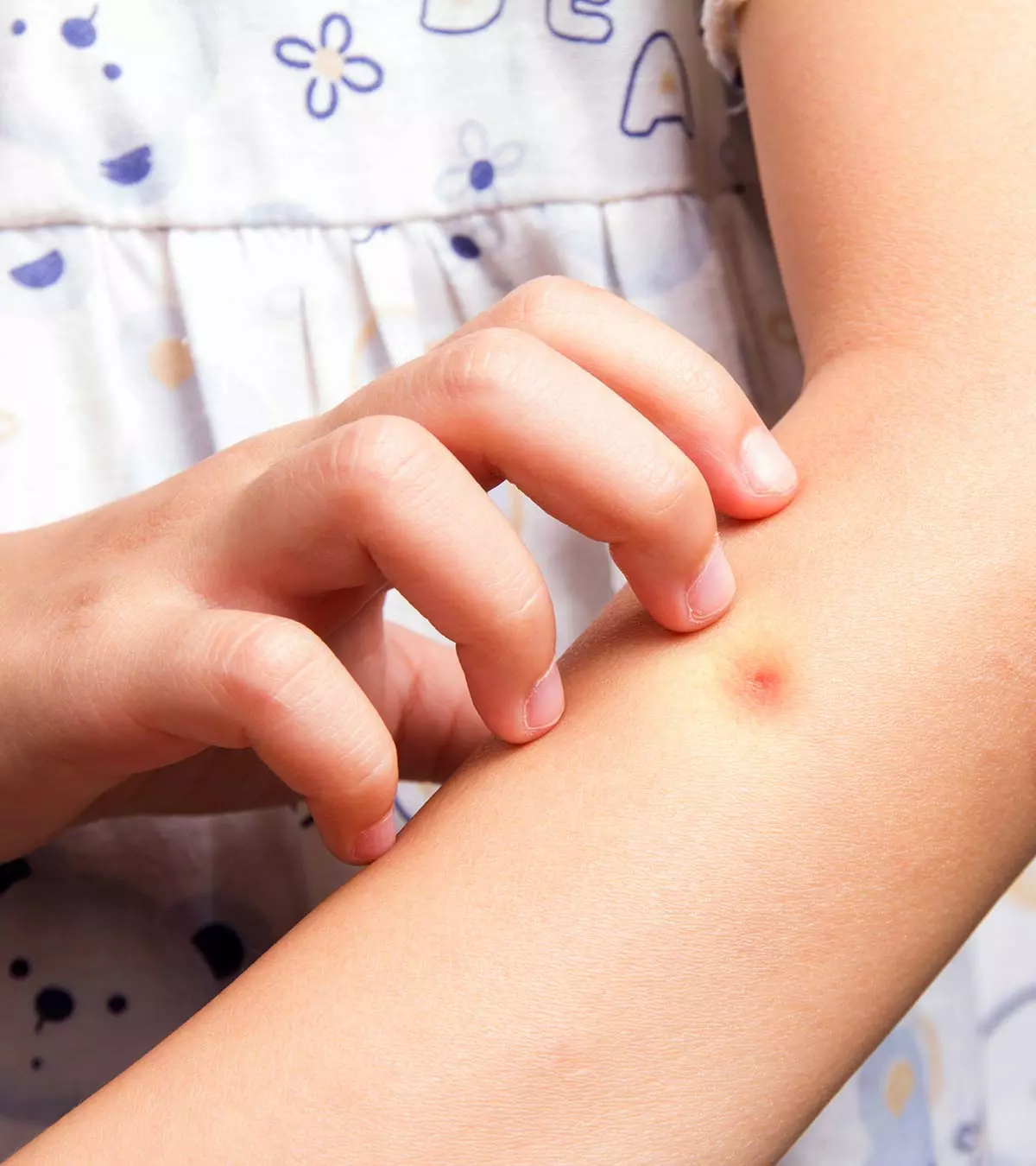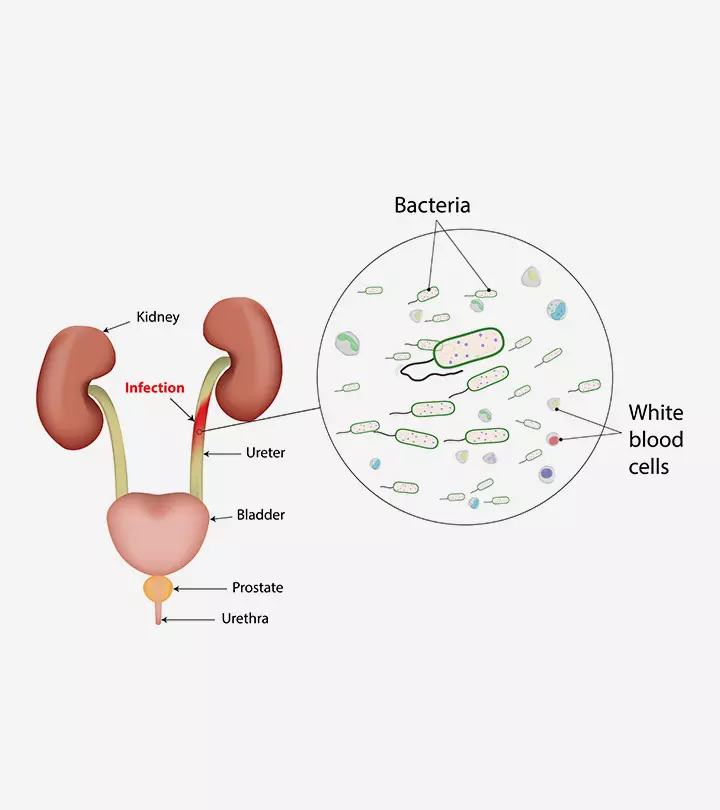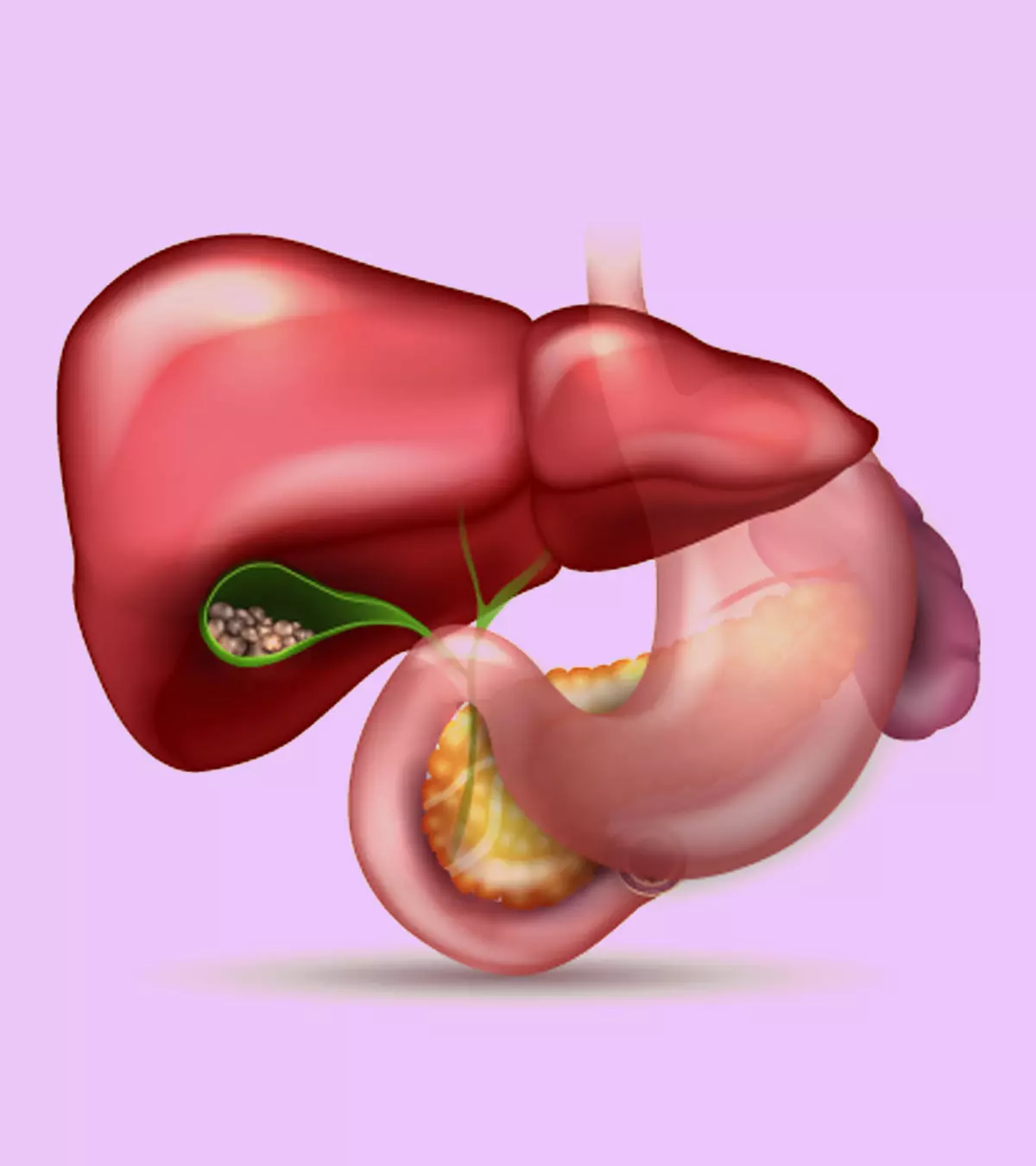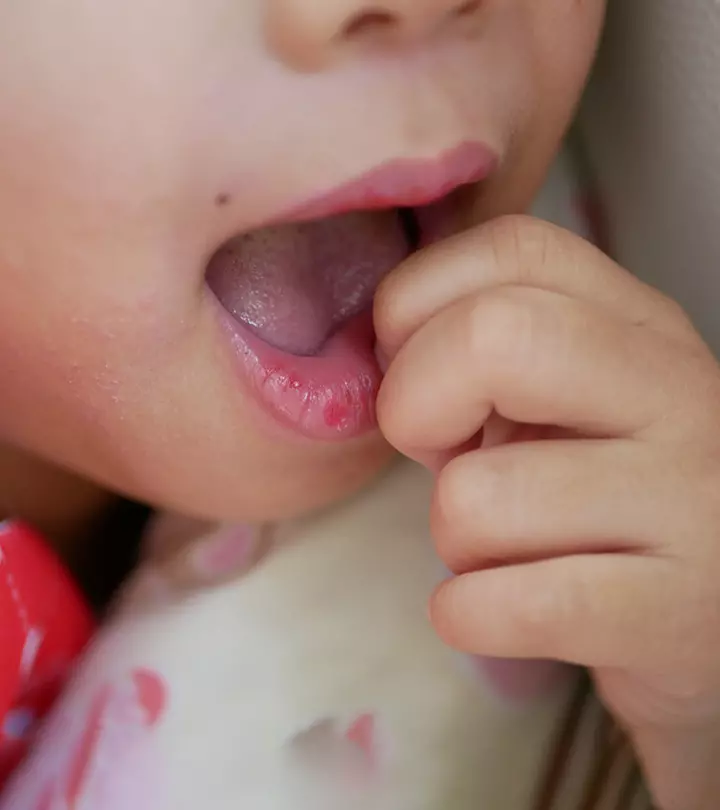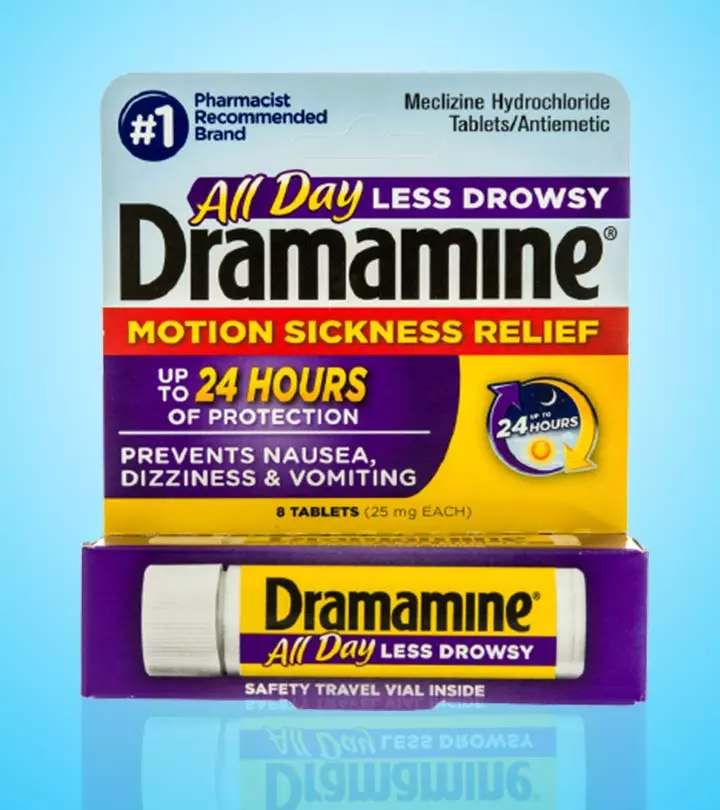
Image: Shutterstock
Dramamine is an antiemetic formulated from the generic drug dimenhydrinate and is useful for alleviating symptoms of motion sickness (kinetosis) such as nausea and vomiting. Dramamine for kids is usually available in chewable grape-flavored pills or tablets and is often used as an over-the-counter drug (1). Dimenhydrinate, a first-generation drug, consists of diphenhydramine and 8-chlorotheophylline with antihistamineiA class of medications used to treat allergies by blocking the action of histamines (allergens) properties. The medicine works by reversing histamine’s effects that trigger the allergic reaction, leading to vomiting (2). This post will help you understand the safety profile of Dramamine for kids.
Key Pointers
- Dramamine is a drug that alleviates the symptoms of motion sickness in children, and its dosage varies based on the child’s age.
- Excess intake of Dramamine could cause muscle weakness, dizziness, and drowsiness.
- Some drugs may cause unwanted reactions when administered along with Dramamine.
- Consult a physician before giving Dramamine to your child to relieve motion sickness.
Safety Of Dramamine For Children
Dramamine is considered safe for children aged two and above. It must not be used for children below two years unless prescribed by a pediatrician. You are advised to always consult a doctor before prescribing Dramamine to your child (3).
 Research finds
Research findsDramamine Dosage For Children
Dramamine can be used to prevent an episode of motion sickness if your child takes a dose 30 minutes to one hour before traveling in boats, airplanes, or going for car rides.
The recommended dosage is as follows (3).
| Age (in years) | Dose | Maximum dose |
|---|---|---|
| 2 to 5 | ½ to 1 tablet every 6-8 hours. | 3 tablets in 24 hours or as directed by the doctor |
| 6 to under 12 | 1 to 2 tablets every 6-8 hours | 6 tablets in 24 hours or as directed by a doctor |
It is advisable to start with the lowest dose and increase it only if it does not work. Also, read the labels carefully before giving Dramamine to children, and consult a doctor if you have any concerns or questions. Have your child chew the medication thoroughly for optimal effectiveness. If you’re on a long trip and missed a dose of medication, give the medication to your child as soon as you remember. However, if it is already time for the next dose, skip the previous dose.
 Point to consider
Point to considerDramamine’s Mechanism Of Action
Uneasiness, vomiting, and nausea in children during traveling are some common symptoms of motion sickness. The brain maintains the body’s balance by analyzing signals from different body areas such as the eyes, inner ear (vestibule), intestine, and various motion-sensitive subcutaneous tissues (proprioceptors). Any mismatch can cause motion sickness.
NeurotransmittersiChemical messengers in the brain that send signals throughout the body to carry out its vital functions such as acetylcholine, histamine, serotonin, glycine, and noradrenaline help forward mismatched signals to the vomiting center in the brain stem. Dimenhydrinate can block the central effects of both histamine and acetylcholine to act as an antiemetic (a drug that prevents vomiting). Additionally, it may prevent spasms in the gut by blocking the action of histamine on the intestinal muscles. However, the exact mechanism is unknown (4) (5).
 Quick fact
Quick factDramamine Side Effects In Children
As with most medications, Dramamine has side effects. The most common side effects in children include (4)
- Drowsiness.
- Dizziness.
- Muscle weakness.
The less common ones include
- Behavioral changes like increased excitement.
- Restlessness.
- Dry mouth and nasal passages.
- Blocked nose.
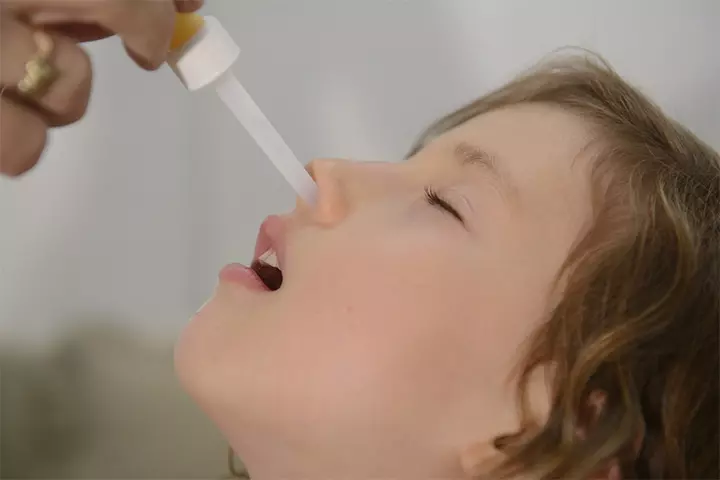
- Blurry vision.
- Increased heartbeat.
Consult your healthcare provider if any of these side effects become severe or your child experiences some other adverse effects.
Drug Interactions With Dramamine
Some drugs may cause unwanted or dangerous effects when administered with Dramamine. Talk to your doctor if your child is on the following medications (6) (7).
- Anti-allergy or cold medications, such as diphenhydramine (Benadryl) or cetirizine (Zyrtec)
- Antidepressants, such as sertraline (Zoloft)
- Antianxiety drugs, such as fluoxetine (Prozac)
- AntiepilepticiAbility of a substance or medicine to control or treat seizures or convulsions by blocking abnormal brain activity drugs, such as valproate (Depakene)
These medications may depress the central nervous system and increase the severity of side effects encountered with Dramamine.
 Experts say
Experts say
Precautions To Take When Using Dramamine
Dramamine is a non-prescription medication readily available in any pharmacy. However, take the following safety precautions when administering it to your child (3) (8).
- Always consult your pediatrician before giving Dramamine if your child has breathing disorders, such as asthma or seizures.
- Seek medical advice if your child has recently undergone any surgery, including dental surgery.
- Ensure your child is not allergic to dimenhydrinate or any other inactive ingredient of Dramamine (aspartame, citric acid, magnesium stearate, methacrylic acid copolymer, sorbitol).
- Do not use it if the blister pack has been tampered with. Store Dramamine at room temperature (20°C to 25°C).
- Ensure the child chews the tablet before swallowing it.
- The medication should be used under medical supervision if the child has phenylketonuriaiA rare inherited disorder caused by an excess of phenylalanine in the body, leading to severe brain abnormalities (an inherited condition that requires diet restrictions). Dramamine chewable tablets contain aspartame as a sweetener, which converts to phenylalanine.
- Dramamine affects alertness in children. So, ensure they avoid activities such as cycling or skateboarding.
- Consult with your pharmacist before giving any other OTC drug or any herbal preparation.
- Keep Dramamine out of children’s reach.
A board-certified pediatrician and mother, Dr. Krupa Playforth, provides insights on using Dramamine in children in her blog. She explains, “Dramamine is a sedating antihistamine that has been approved in the US for children over two years old. While it is not widely recommended due to potential side effects, there are situations where the benefits may outweigh the risks. I recommend discussing it with your pediatrician if your child has ongoing debilitating symptoms of motion sickness (i).”
Symptoms Of Dramamine Overdose
Children may accidentally overdose on Dramamine. In such a case, watch out for the following symptoms (6).
- Dilated pupils
- Seizures
- Hallucination
- Extreme drowsiness
- Irritation and restlessness
Dramamine can alter the actions of many neurotransmitters and cause these effects. Seek emergency medical attention if you notice any of these symptoms in your child.

 Point to consider
Point to considerFrequently Asked Questions
1. Does Dramamine put children to sleep?
Dramamine is a brand name that has multiple products. Products containing Dimenhydrinate as the active ingredient may cause sleepiness as a side effect in children but are not meant to be used as sleeping aids. However, the ones having Meclizine as the active drug (usually labeled “less drowsy”) may show this side effect to a lesser extent (9).
2. Are Dramamine and Benadryl the same?
No, they are not the same. Benadryl contains the drug Diphenhydramine as the main active ingredient, whereas Dramamine contains Dimenhydrinate, which is a combination of two drugs (Diphenhydramine and 8-chlorotheophylline) (2) (10).
3. Is Dramamine good for treating anxiety in children?
Dramamine is primarily used to treat symptoms of motion sickness such as nausea, vomiting, and dizziness in children. When taken in large doses, dimenhydrinate can have psychoactive effects. However, it is not typically used to treat anxiety in children (14). If your child is experiencing anxiety, it is important to speak with a healthcare professional to determine the appropriate treatment.
4. What are the alternatives for Dramamine for kids?
Dramamine is prescribed to prevent the symptoms of motion sickness when its benefits outweigh its risks. While scopolamine and Benadryl are common alternatives for treating motion sickness, you may also try natural remedies, such as offering small amounts of food before travel, seating your child by the window, using flavored lozenges, and distracting your child to help ease motion sickness symptoms (17).
Doctors generally prescribe Dramamine for kids if they experience motion sickness. However, consult your pediatrician before the trip to check if the medicine is suitable for your child, especially if they are on any other medications. Also, ask your doctor for alternatives if the child has taken Dramamine previously and experienced any side effects. Further, if your child complains of discomfort after taking the medication or shows any symptoms of overdose, such as extreme drowsiness and seizures, consult a doctor for prompt medical attention.
Infographic: Can You Prevent Motion Sickness In Children Without Medications?
Motion sickness is a common problem among children. However, it may not always be advisable to give medications to prevent it. Thankfully, there are some non-medical ways to manage motion sickness in children. Go through the infographic below to learn about such natural preventive methods. Illustration: Momjunction Design Team
Illustration: Dramamine For Kids: Safety Side Effects And Precautions

Image: Dall·E/MomJunction Design Team
Personal Experience: Source
MomJunction articles include first-hand experiences to provide you with better insights through real-life narratives. Here are the sources of personal accounts referenced in this article.
i. Motion sickness;https://www.thepediatricianmom.com/blog/motion-sicknes
References
- Dramamine for Kids- dimenhydrinate tablet chewable.
https://dailymed.nlm.nih.gov/dailymed/index.cfm - Paul Enarson et al.; (2011); Dimenhydrinate use for children with vomiting.
https://www.ncbi.nlm.nih.gov/pmc/articles/PMC3076472/. - Dramamine for Kids
https://dailymed.nlm.nih.gov/dailymed/fda/fdaDrugXsl.cfm?setid=12bc3f17-ed62-4d0d-9b1e-3835579e711b&type=display. - Andreas Koch et al.; (2018); The Neurophysiology and Treatment of Motion Sickness.
https://www.ncbi.nlm.nih.gov/pmc/articles/PMC6241144/#R32. - Dimenhydrinate.
https://pubchem.ncbi.nlm.nih.gov/compound/Dimenhydrinate - Dimenhydrinate.
https://www.mottchildren.org/health-library/d00861a1. - Ian Kodish et al.; (2011); Pharmacotherapy for anxiety disorders in children and adolescents.
https://www.ncbi.nlm.nih.gov/pmc/articles/PMC3263391/. - Dimenhydrinate.
https://medlineplus.gov/druginfo/meds/a607046.html - Antiemetic Medicines: OTC Relief for Nausea and Vomiting.
https://familydoctor.org/antiemetic-medicines-otc-relief-for-nausea-and-vomiting/ - Diphenhydramine Dosing Table.
https://www.healthychildren.org/English/safety-prevention/at-home/medication-safety/Pages/Diphenhydramine-Benadryl-Antihistamine.aspx - Dramamine original formula.
https://www.dramamine.com/products/motion-sickness-medicine/dramamine-original-formula - Dimenhydrinate.
https://medlineplus.gov/druginfo/meds/a607046.html - Dramamine.
https://www.dramamine.com/ - Abuse and Misuse Potential of Dimenhydrinate: A Review of the Clinical Evidence [Internet].
https://pubmed.ncbi.nlm.nih.gov/26985532/ - Paul Enarson et al. (2011); Dimenhydrinate use for children with vomiting.
https://www.cfp.ca/content/57/4/431.long - Zachary A. FLAKE et al. (2004); Practical Selection of Antiemetics.
https://www.aafp.org/pubs/afp/issues/2004/0301/p1169.html#afp20040301p1169-t3 - Motion Sickness.
https://wwwnc.cdc.gov/travel/page/motion-sickness
Community Experiences
Join the conversation and become a part of our nurturing community! Share your stories, experiences, and insights to connect with fellow parents.
Read full bio of Dr. Dur Afshar Agha
Read full bio of Dr. Joyani Das
Read full bio of Dr. Ritika Shah
Read full bio of Vidya Tadapatri










